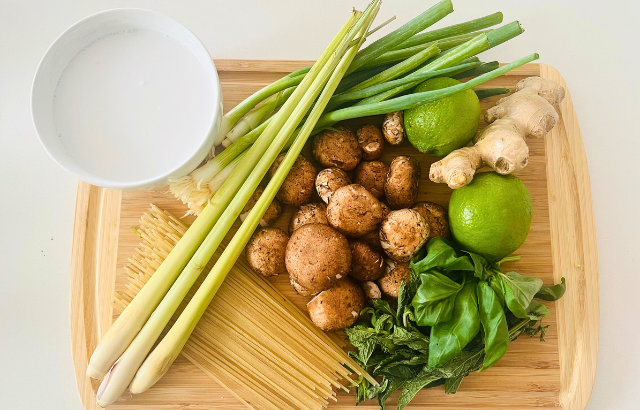Spring is knocking at the door, and we have the perfect recipe to bridge the gap between seasons. Our tasty lemongrass, mushroom, and coconut soup is light and nourishing, while still being creamy and comforting. The lemongrass embodies the essence of spring aromas with its citrus earthiness pairing beautifully with the meaty mushrooms and creamy coconut broth accented with hints of ginger, lime, and chilies.
This soup is a great way to get a fully balanced meal in one scrumptious bowl. We added brown rice noodles, Napa cabbage and tofu for extra fiber and protein. It also works great with any grain, hearty veggie, and protein choice of your liking to create tasty new combos that are big on flavor and easy to prepare. This delicious soup is also packed full of health-supporting ingredients that help boost our natural detoxing pathways, giving our bodies their form of spring cleaning.
Lemongrass, Mushroom, and Coconut Soup
Serves: 4
Ingredients
- 1 tablespoon high heat oil (avocado, sunflower, coconut)
- 1 pound mushrooms, sliced (I used baby Bella mushrooms)
- 2-inch piece of ginger, grated or diced
- 4 scallions, thinly sliced (reserve some of the dark green for garnish)
- 2 stalks of lemongrass or 1 tablespoon lemongrass paste or 2 teaspoons lemongrass powder
- 3-4 garlic cloves, minced
- 1 tablespoon red curry paste or 1 teaspoon curry powder (it will give it a little different flavor but still delicious)
- 2 tablespoons maple syrup
- 1 lime, juiced
- 4 cups vegetable or chicken stock
- 1 13.5 ounce can of coconut milk
- 1 to 2 chili peppers (optional. I use Bird’s Eye)
- 2 cups chopped green leafy vegetables (I used Napa cabbage. Bok choy, any cabbage, broccoli, kale or chard also work well.)
- Salt and pepper to taste
- Basil, mint, cilantro chopped, for garnish
- 1 package silken tofu, raw (you can also use sautéed firm tofu or chicken or fish)
- 1 pack of rice noodles (I used brown rice udon noodles.)
Directions
- Prep the vegetables and lemongrass. For the lemongrass cut ends off, remove the first outer layer and cut in half. Hit each half with the back of your knife to split it open.
- Heat the oil in a large stock pot (soup pot) over medium-high heat.
- Add in the sliced mushrooms and sauté for 5-6 minutes until soft and beginning to brown. Toss them occasionally for even browning.
- Remove the mushrooms from the pot and set aside. Return the pot to the stove, lower the heat to medium, and add a little more oil. Add the scallions, ginger, and lemongrass.
- Sauté for 3 minutes until fragrant and scallions are beginning to soften, stirring occasionally. Add garlic, red curry paste, and a sprinkle of salt and cook for 1 more minute.
- Stir in the maple syrup and lime juice, then cook for 1 minute, deglazing the pan. Make sure to scrape up all the yummy bits on the bottom of the pan. This adds a lot of flavor.
- Add the stock and chilies if using them, bring to a boil, and then reduce to a simmer.
- Simmer for 15 minutes, add Napa cabbage, coconut milk, and mushrooms, and simmer for 7-10 minutes until the cabbage is tender.
- While the soup simmers, cook rice noodles in boiling water according to the package and drain.
- Remove lemongrass from the soup. Taste and adjust seasoning.
- For serving, divide silken tofu into four pieces and distribute between the 4 bowls. Top with cooked rice noodles. Ladle hot soup over tofu and noodles.
- Top with fresh herbs and scallions.



 Ananda Kaplan
Ananda Kaplan 


